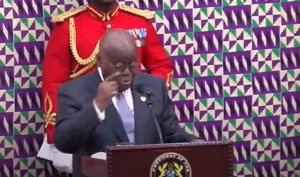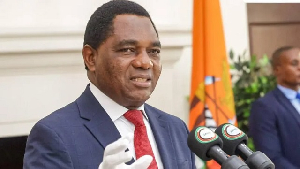Fatimatu Abubakar, information minister-designate, has called on Ghanaians and other corporate organizations to support institutions that have been set up with the mandate of fighting corruption and corruption-related issues.
Ms Abubakar opined that institutions, including the Economic and Organised Crime Office (EOCO), the Commission on Human Rights and Administrative Justice (CHRAJ), and the Office of the Special Prospector have all been created and empowered to fight corruption and its related issues, hence, must be supported by all and sundry.
Speaking in an interview with TV3's Beatrice Adu, the former deputy information minister said, "The perception has not improved, but it is not the reflection that over the period we have deteriorated.
"When we talk about the fight against corruption, let us not make it as if the president is the complainant, he is the judge, he is the prosecutor, he is everything like we are in a dictatorship, he can just say 'I heard this person collecting bribe or gave bribe, and I have taken the laws into my own hands".
She added, "we work within a democracy, and one characteristic is that we have institutions; the constitution has mandated institutions like CHRAJ to deal with complaints, and we have the Special Prosecutor's office, which the president himself set up, advocated for, and has provided bursary support for the fight against corruption, we have the CID of the Police, we have EOCO.
"Collectively as a country, we should encourage and empower those institutions to act without fear or favour," Fatimatu posited.
For the fourth consecutive year, "Ghana scored 43 out of a clean score of 100 and ranked 70th out of 180 countries and territories included in the Corruption Perceptions Index (CPI) 2023 released on 30th January 2024 by Transparency International (TI). This marks the fourth consecutive year of stagnation in Ghana's anti-corruption efforts, as indicated by the CPI."
Ghana's deteriorating justice system, which is compromising accountability to grant public officials the liberty to thrive in corrupt activities, according to Transparency International, is the reason for the country's continuous stagnation.
"Under the theme for the CPI 2023 – Corruption and Justice, Ghana's stagnated score highlights a global trend of deteriorating justice systems, which is reducing the accountability of public officials and therefore allowing corruption to thrive.
"The connection is reinforced by Ghana's performance in the Rule of Law Index produced by the World Justice Project, which demonstrates a concerning decline. In the 2015 Rule of Law Index, Ghana scored 0.60 and ranked 34, but by 2023, Ghana's score had decreased to 0.55, with a corresponding drop in ranking to 61," the report added.
The Ghana Integrity Initiative is therefore recommending to Parliament to lay the Conduct of Public Officers' Bill to situate the asset declaration at a position where verification would become compulsory, defining severe punishment for non-compliance.
"The Executive should urgently take steps to lay the Conduct of Public Officers' Bill in Parliament, ensuring that provisions on assets declaration require verification and come with severe sanctions for non-compliance while GII also calls on the Legislature to attach an equal level of urgency to its timely passage. The Executive and the Legislature must take steps to bridge the legal gaps necessary for the prosecution of selected corruption cases outside our current legal framework," the GII recommended.
General News of Friday, 1 March 2024
Source: peacefmonline.com













